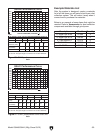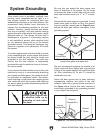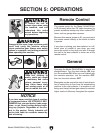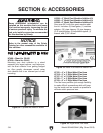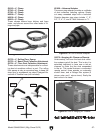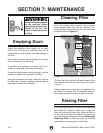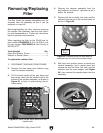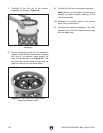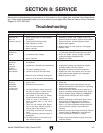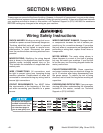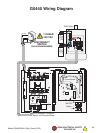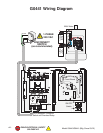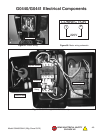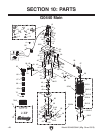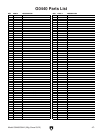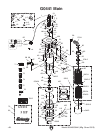
Model G0440/G0441 (Mfg. Since 03/12)
-41-
Review the troubleshooting and procedures in this section to fix or adjust your machine if a problem devel-
ops. If you need replacement parts or you are unsure of your repair skills, then feel free to call our Technical
Support at (570) 546-9663.
SECTION 8: SERVICE
Troubleshooting
Symptom Possible Cause Possible Solution
Motor will not
start, or it
growls on start up.
1. Power supply fuse or circuit breaker
has tripped.
2. Toggle switch is broken inside.
3. Start capacitor is at fault.
4. Motor fan cover is dented.
5. Motor is at fault.
1. Disconnect power, and inspect circuit for
electrical shorts and repair; replace circuit breaker
2. Disconnect power, and check/replace switch.
3. Replace start capacitor.
4. Replace motor fan cover (and fan, if damaged).
5. Replace motor.
Motor runs
slower than
normal.
1. Poor electrical connection.
2. Low power source voltage.
3. Motor is at fault.
1. Inspect the power supply for loose, corroded,
or overheated electrical connections and repair.
2. Have the power source voltage checked;
reduce the length of extension cord.
3. Replace the motor.
Loud,
repetitious
noise, or
excessive
vibration
coming from
dust collector.
1. Dust collector is not on a flat surface
and wobbles.
2. Impeller fan is damaged and unbalanced.
3. The motor mounting is loose.
4. Impeller is loose on the motor shaft.
5. Motor fan cover is dented, causing the
motor fan to hit the cover while spinning.
1. Stabilize the dust collector.
2. Unplug dust collector, and inspect the impeller
for dents, bends, loose fins; replace.
3. Re-tighten all fasteners on the dust collector.
4. Replace the motor and impeller as a set if the
motor shaft and the impeller hub is damaged.
5. Replace motor fan cover.
Dust collector
does not
adequately
collect dust
or chips; poor
performance.
1. Dust collection drum is full.
2. Filter is dirty.
3. Restriction in the duct line.
4. The dust collector is too far away from
the point of suction, or there are too
many sharp bends in the ducting.
5. The lumber is wet and not flowing
through the dust lines smoothly.
6. There is a leak in the ducting, or a
series of small leaks, or too many
open ports.
7. There are not enough open branch
lines at one time, thereby causing a
velocity drop in the main line.
8. The ducting and ports are incorrectly
sized.
9. The machine dust collection design is
inadequate.
10. The dust collector is too small for the
dust collection system.
1. Empty collection drum.
2. Clean filter.
3. Remove dust line from dust collector inlet and
unblock the restriction in the duct line. A plumbing
snake may be necessary.
4. Relocate the dust collector closer to the point of
suction, and rework ducting without sharp bends.
Refer to System Design, beginning on Page 27.
5. Process lumber with less than 20% moisture
content.
6. Rework the ducting to eliminate all leaks. Close
dust ports for lines not being used. Refer to
System Design on Page 27 for more solutions.
7. Open 1 or 2 more blast gates to different branch
lines to allow the velocity in the main line to
increase.
8. Reinstall correctly sized ducts and fittings. Refer to
System Design on Page 27 for more solutions.
9. Use a dust collection nozzle on a stand.
10. Install a larger dust collector to power your dust
collection system.



